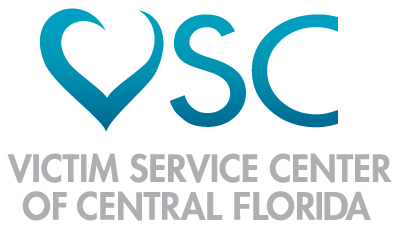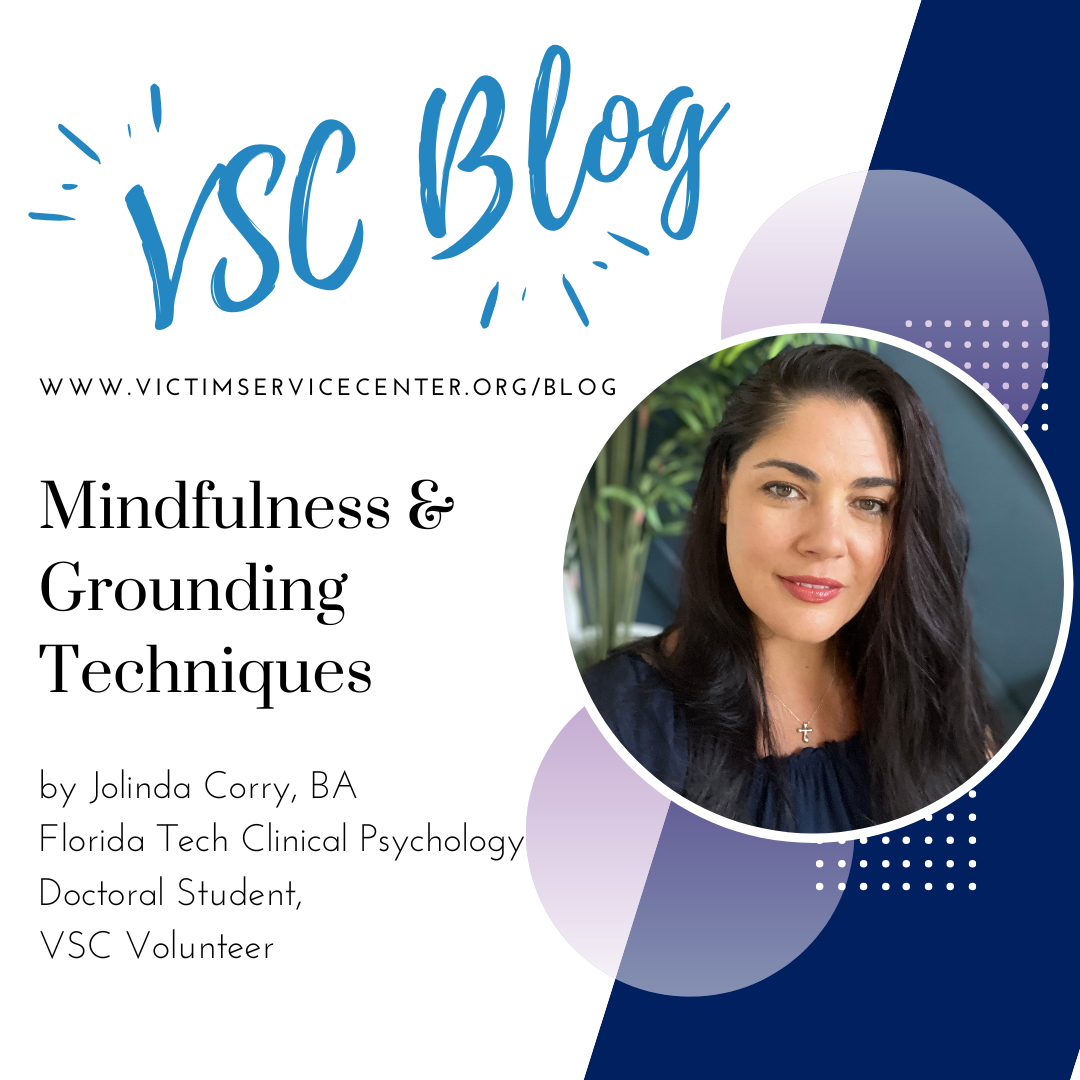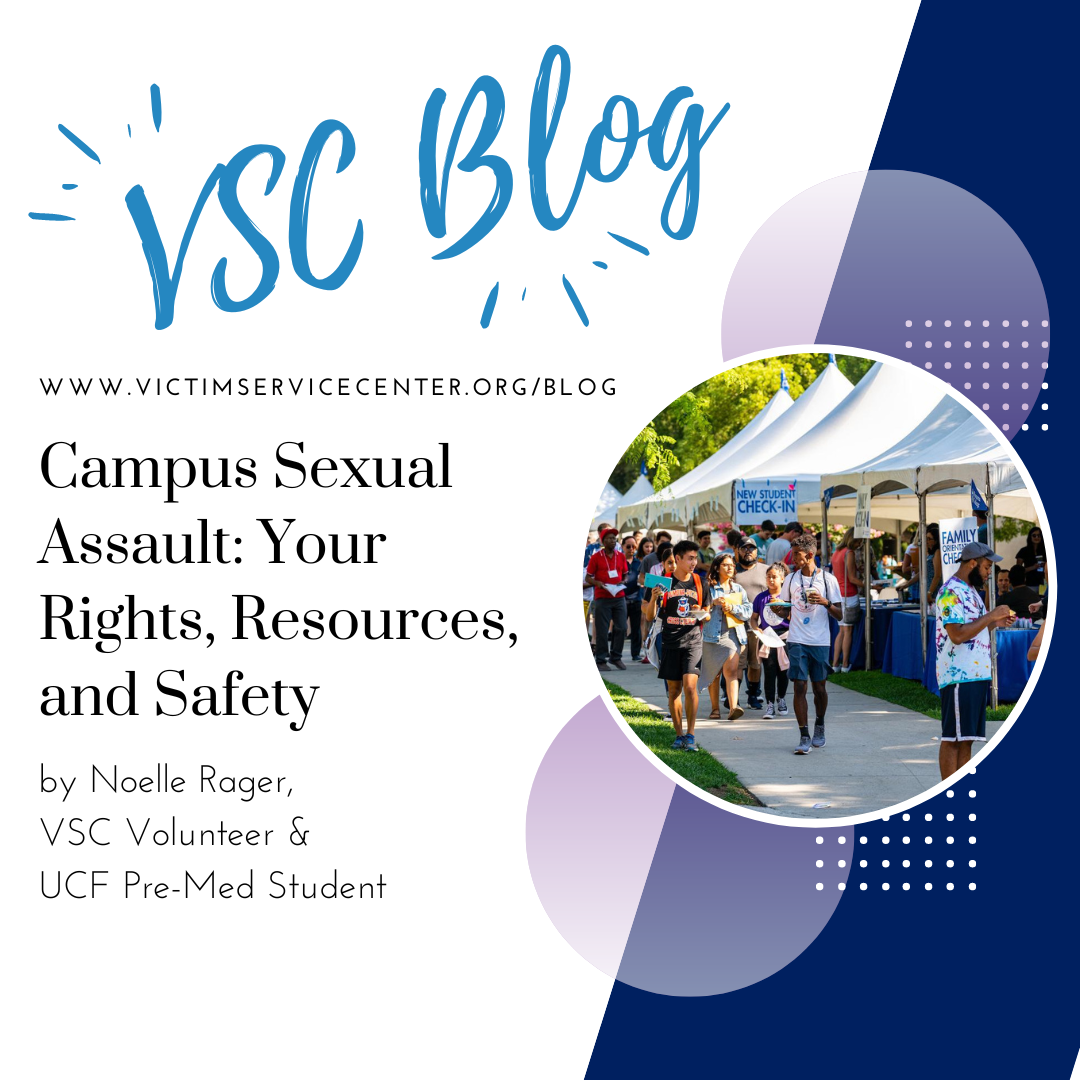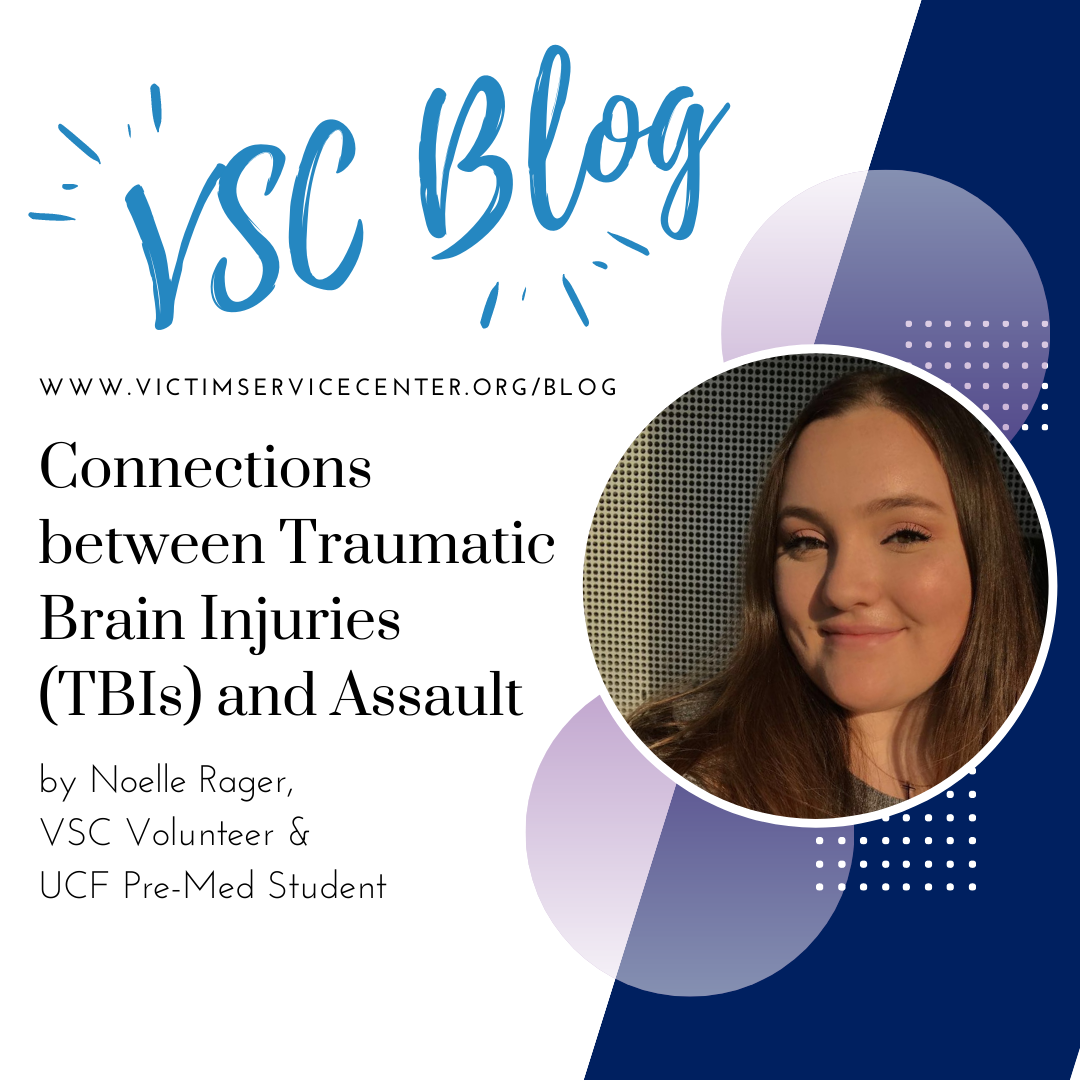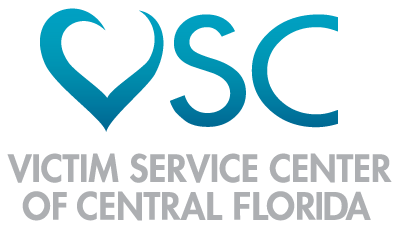by Mahnaz Asif, Rollins College Mental Health Counseling Graduate Student and VSC Social Justice Intern
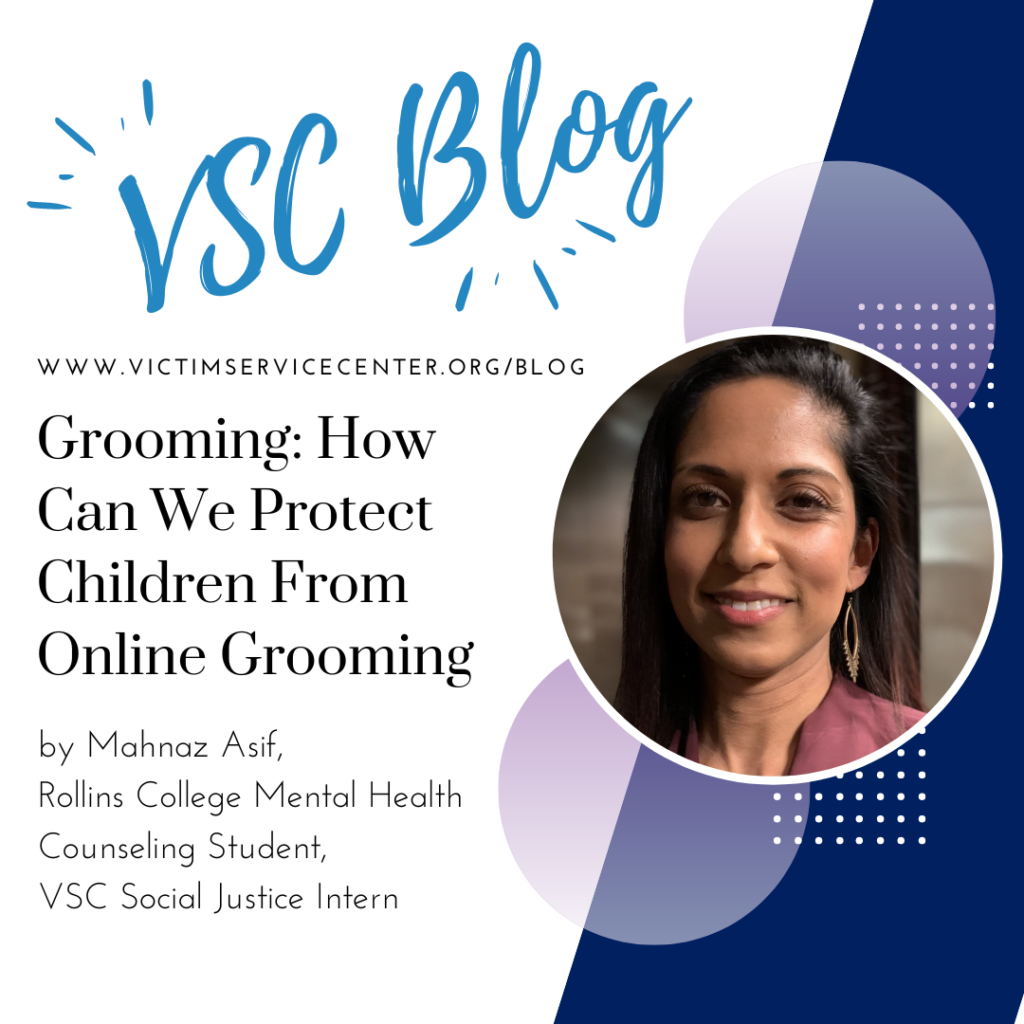
“Being a survivor is about learning to cope. I am a survivor because I am still here. It is hard to be a survivor. I put so much effort into it and people. You need to have some sort of passion in life. I have a passion to live.” ~ Ally, a survivor
As described on ecpact.org, Ally was sexually exploited by a man she met online in Canada. At that time, she was struggling with family issues and her identity. Like many teenagers, she looked for support and attention online. She met a man online that gave her the attention she craved. Eventually, they met in person, and he sexually assaulted her. He blackmailed her to keep her silence. The shame of the secret led to depression which led her to abuse drugs. Ally is just one instance of online grooming. Ecpat.org
What is grooming?
Grooming is an intentional act of an adult to befriend a child, establish an emotional connection and find a child’s insecurities. The perpetrator uses grooming tactics such as attention, validation, unconditional regard to build a child’s trust and create opportunities to perpetrate abuse. Predators have weaved their way into the online universe by contacting children through video game chats as another child or a respectable adult. They offer support and validation that is missing in that child’s life.
According to Childnet.com, online grooming consists of social media, video games, and private chats. Predators use fake accounts, names, and photos to befriend the child. They appear as another child, modeling agent, a scout, sports coach, or famous influencer that pretend to have the same interests to build trust and establish a friendship. Online predators are indifferent to race, ethnicity, or gender- any child is in danger. Some children may be more susceptible due to other vulnerabilities such as special educational needs disability. They have difficulty in learning and communication skills.
After the trust is gained, they direct the conversation towards sexual experiences by asking to share naked photos or videos. Some predators may set up a location to meet. These predators eventually manipulate, blackmail, and control the child. Also known as sextortion, instead of money, they demand more photos or videos. An article on THORN.org, predators use photos and videos as leverage. If the child does not comply, they threaten to share it family and friends thus creating shame and isolation in children. As a result, the child begins to isolate themselves from friends and family. It is important to remember that online groomers are not always strangers. They could be family friends or someone they have met at a social gathering, and they use online to build rapport.
The National Center for Educational Statistics found children spend 50% more on-screen time due to the pandemic and school closures.
Along with an increase of time being spent online, Children are also participating in sexting.
THORN’s article states that self-generated child sexual abuse material (SG-CSAM), is rapidly growing to exploit children. A consensual or coercive naked photo taken by the child is sent to a known individual known as “sexting” or “sharing nudes.” In the future, these photos can be used by offenders to groom other children. Sexting gives the predator control over photos/videos sent. The predator may share those photos with other people or use it to blackmail the victim. According to the study, adolescents think sharing nudes is a form of sexual exploration and flirting. About 40%, 1 in 5 girls and 1 in 10 boys, find it normal to share nudes.
The most popular image/video sharing platforms are Instagram (56%) and Snapchat (55%). On Snapchat, 70% have shared their photos, and 69% have seen others. And 54% have shared other’s photos. On Instagram, 66% share, and 67% seen others. Online predators groom a child by making an emotional connection. Afterward, they begin sexual conversations, and it leads to sexting which is sending naked photos.
How can we spot online grooming?
With children being online more it can be difficult to know what is happening in the virtual world. These red flags may not mean that a child is experiencing online grooming however they could be indicators to check in and have a conversation. According to the article, Grooming: What parent should know and what schools should do if they suspect it. The typical red flags for parents to pay attention to:
- Wanting to spend more time on the internet
- Being secretive about who they are talking to online, and websites visited.
- Switching screens
- Noticing new items that have not been given by you, a friend, or a family member
- Using sexual language that is not age-appropriate
- Expressing hostile or volatile behavior
How can we protect children from online grooming?
Parents/caregivers need to teach children about online predators. Starting the conversation at a young age leaves the children equipped to feel safe to talk to someone if situation as such arises. Children at an early age need guidance on body boundaries and consent to prevent falling for the predators’ devious tricks of sharing nude photos. It is essential for parents, caregivers, and teachers to begin a conversation to prevent future harm. A great resource by Michigan State University called, “Preventing Grooming by Child Sexual Predators,” provides great information on opportunities to speak with children about predators. For example:
- Talk About Secrets
- Keeping secrets can be harmful. A responsible adult will not ask a child to keep a secret for their parents. Children must know that they will not get in trouble if they tell you a conversation they had with another adult and they asked the child to keep a secret. Children should know that parents/caregivers will support them no matter what.
- Listen, Listen, and Listen Some More
- Listen carefully to the child. It shows that you love, value, and respect them. Communicate by giving them your full attention. Listen without judgment. Children are likely to share more information if they know they will not be judged, disrespected or punished.
- Teach Children to be Assertive
- Respectfully encourage children to voice their opinions about likes and dislikes; this will help them stand up for themselves and feel empowered. Children may not feel empowered when an adult puts them in an unsafe situation. Children need to know that it is ok to say “NO” to adults. The word “NO” is a complete sentence and puts a boundary in place.
- Teach Children consent
- Consent is giving someone permission to do a certain activity or for something to happen. Such as, when you go to the doctor, you give consent for the doctor to perform a certain procedure. Also, in relationships each individual has to give or deny consent. Consent is freely given; it should be clear and specific. A person has the right to deny consent or change their mind if the situation seems unsafe.
- Consent can be modeled at home by asking your children to touch, hug, or kiss them, and respecting their wishes if they say, “no.” This teaches children personal boundaries.
- Talk About Consent and Relationships
- Talk to children at an early age about consent and respect in romantic relationships. Talking to them openly encourages them to come talk to you when they are concerned or confused when something happens to them, and they feel unsure.
The goal is to keep children safe and to be actively involved. The key is to be vigilant and prepared to protect children and help them build skill necessary that will help keep them safe from in person and online predator. More great tips on: https://www.canr.msu.edu/creating-safe-environments/uploads/files/Final%20-%20Preventing%20Grooming.pdf
Unfortunately, just like with any risk reduction we cannot make sure children are and will be safe 100% of the time. However, early conversations, support, and trust can prevent online grooming and if something does happen, children will know who to reach out for help.
Resources:
TO REPORT CHILD PORNOGRAPHY, OBSCENITY, OR TO REPORT A CYBERCRIME: www.cybertipline.com
Or call: 1-800-THE-LOST (provided by the National Center for Missing and Exploited Children). The congressionally mandated CyberTipline is a reporting mechanism for cases of child sexual exploitation including child pornography, online enticement of children for sex acts, molestation of children outside the family, sex tourism of children, child victims of prostitution, and unsolicited obscene material sent to a child. Reports may be made 24 hours per day, 7 days per week.
Online Resource:
Darkness to light
Missingkids.org
Stopsextortion.com tips and resources to protect yourself and loved ones before it starts.
Riverbridgerc.org:
In these 10 episodes Meghan Hurley Backofen provides caregivers with 10 Tips for Sexual Abuse Prevention. She discusses much of the misinformation caregivers have that put children at greater risk for sexual abuse trauma. She also identifies what children need to know to be a “least likely” victim. This class is based on her work with sexual abuse survivors and extensive knowledge of sexual abuse victimization. Caregivers will feel empowered after learning specific strategies in how to talk with children about this difficult topic and how to respond if sexual abuse is suspected. This podcast is an excellent resource for parents who want to share Meghan’s book “Who’s the Boss of this Body” with their child.
Podcast:
On audible
What grooming looks like and how to cope afterwards by Emma Cantrell
[The respect room] Preventing Sexual Grooming Part 1
BBC Radio: File on 4: Online Grooming
Books for parents:
Mia’s Secret: story of a young girl groomed by her mom’s friend
MOSAC: Book What do I do now? MOSAC published a comprehensive guide for mothers of sexually abused children. It is an important resource for professionals to offer to moms and family members of sexually abused children. Amazon link below. Also available at Apple and book source.
Shefali Tsabary: renown parent expert and author. “The conscious parent”
Speaker: Resurrection Graves is child sexual abuse expert.
She is available for radio, T. v. and speaking engagements at
Resurrection.wordpress@yahoo.com or 202-717-7377
